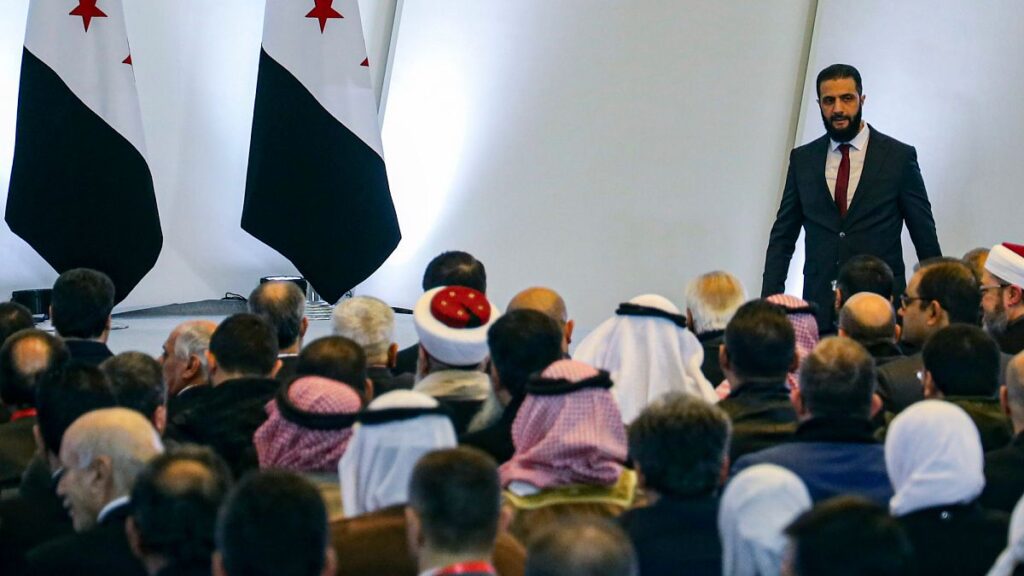Syria’s interim President Ahmad al-Sharaa called for unity, but scepticism remains over the new rulers’ promises of inclusive governance.
Syria’s interim rulers kicked off a long-awaited national dialogue conference on Tuesday as they seek to rebuild the country following the ouster of former President Bashar al-Assad and nearly 14 years of civil war.
Some 600 people from across Syria were invited to the event in Damascus, hosted by the new authorities led by the Islamist former insurgent group Hayat Tahrir al-Sham, or HTS. The group spearheaded the offensive that toppled al-Assad in early December.
“Just as Syria has liberated itself by itself, it is appropriate for it to build itself by itself,” interim President Ahmad al-Sharaa told the conference.
“What we are experiencing today is an exceptional and rare historical opportunity in which we must use every moment to serve the interests of our people and our nation and honour the sacrifices of its children,” he said.
Al-Sharaa, who has promised an inclusive political transition since taking power, will be closely watched by both Syrians and the international community, including nations still weighing whether to lift sanctions imposed during al-Assad’s authoritarian rule.
Syria faces huge challenges, from rebuilding an economy and war-wrecked infrastructure, to establishing a new constitution and justice mechanisms for individuals accused of war crimes.
Although incidents of revenge and collective punishment have been far less widespread than expected, many people in Syria’s minority communities — including Kurds, Christians, Druze and members of Assad’s Alawite sect — are concerned for their future and not yet convinced by the new rulers’ promises of inclusive governance.
HTS was formerly affiliated with al-Qaeda, although it broke ties and al-Sharaa has since advocated for coexistence.
Rebuilding ties with the West
The organisers of the Damascus conference said all of Syria’s communities were invited. Women and members of minority religious communities were among the attendees. The event is meant to come up with nonbinding recommendations on the country’s interim rules ahead of the drafting of a new constitution and formation of a new government.
Syria’s new Islamist leaders also face the challenge of transforming former insurgent factions into a single national army, which they say should control all of Syria’s territory.
Some armed groups — mainly the US-backed and Kurdish-led Syrian Democratic Forces (SDF) that holds sway in northeastern Syria — have refused to disarm and dissolve their units.
SDF figures weren’t invited to the conference, and a group of mostly Kurdish political parties said in a statement that the conference did “not reflect the reality of the Syrian components”.
Along with the internal tensions, Syria’s new authorities face external threats.
Israeli Prime Minister Benjamin Netanyahu said on Sunday that his country will not allow Syria’s new army or the HTS to “enter the area south of Damascus”. He said that Israel aimed to protect the Druze, a religious minority who live in southern Syria and in Israel’s Golan Heights.
After al-Assad’s fall, Israeli forces moved into territory in southern Syria adjacent to the Israel-annexed Golan Heights and have made it clear they plan to stay there indefinitely.
Syria’s new rulers have not directly responded to Netanyahu’s warning but al-Sharaa said at the Damascus conference that Syria must “firmly confront anyone who wants to tamper with our security and unity”.
Interim Foreign Minister Asaad al-Shibani said Syria’s new authorities “will not accept any violation of our sovereignty or the independence of our national decisions”.
He also touted the new government’s efforts to rebuild diplomatic ties with Arab and Western countries and push for lifting of sanctions imposed during Assad’s rule.
Read the full article here

